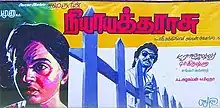Nyaya Tharasu
Nyaya Tharasu is a 1989 Indian Tamil-language film, directed by K. Rajeshwar, making his directorial debut, starring Nizhalgal Ravi and Radha in lead roles. The film, produced by M. Veda had musical score by Sankar Ganesh and was released in 1989.[1] The film was a remake of Malayalam film Panchagni.[2] A remarkable tale of a remarkable woman, who puts her commitment to social activism above everything else, including her own love for an adoring man. Under the debut direction of K. Rajeshwar, Radha made a sensation in Tamil in one of the most powerful female characters in Indian cinema ever.
| Nyaya Tharasu | |
|---|---|
 Poster | |
| Tamil | நியாயத் தராசு |
| Directed by | K. Rajeshwar |
| Produced by | M. Veda |
| Screenplay by | M. Karunanidhi |
| Story by | M. T. Vasudevan Nair |
| Starring | |
| Music by | Sankar Ganesh |
| Cinematography | G. P. Krishna |
| Edited by | P. Venkateswara Rao |
Production company | Menaka Pictures |
| Distributed by | Arulnidhi Creations |
Release date | 11 August 1989 |
Running time | 150 min |
| Country | India |
| Language | Tamil |
Plot
The movie revolves around the incidents in a two-week period, when Bharathi (Radha), a Naxal activist is out in parole. She is serving life sentence in the central jail, Kannore after being charged for the murder of Paramanandham (Vijayan), a landlord, who she had seen kill a young tribal woman after she was raped and impregnated by him.
Bharathi's mother, a past freedom fighter who is on her deathbed, is relieved to see her, and is under the impression that she is free now. Her younger sister Savithri, her husband Vijayasarathi and her nephew are happy to have her back home. But her younger brother, Bose (Charle), an unemployed guy, addicted to drugs is angered by her mere presence, blaming her for his inability to secure a good job. Bharathi's older brother who is home from Delhi to perform the death rites of her mother refuses to even talk to her, and leaves after a big brouhaha, leaving his nephew to do the rites. Most of her acquaintances are intimidated by her, except her old classmate Amutha (Kutty Padmini). Amudha had married her college sweetheart, Nagappan (Livingston) and lives close to Bharathi's home.
Thazhamuthu (Nizhalgal Ravi), a Nyaya Tharasu journalist, tries to get an interview with Bharathi, she declines initially and is annoyed by his persistence.
As the days pass, Bharathi feels unwanted, and ends up having no place to live. Savithri suspects an affair between her husband and Bharathi, making it hard for Bharathi to stay with them. Amutha's husband had changed a lot in years, had degraded into a womanizer, and Bharathi can't stay with them either. Ultimately Bharathi, asks Thazhamuthu for help and ends up staying at his place.
With time, Bharathi and Thazhamuthu get closer, and a lovely relationship blossoms between the two. As Bharathi is nearing the completion of her parole, Thazhamuthu, with great difficulty, succeeds in getting the government remission order in time, so that Bharathi no longer has to go back to jail. By this time Savithri and Bose reconcile with Bharathi, and are overjoyed to hear about her release. Bharathi rushes to Amutha's place to share the good news, but there she is shocked to see Amutha, being gang-raped by her husband Nagappan and friends. True to her righteous self, Bharathi ends up shooting Nagappan with his hunting rifle and ultimately surrenders herself at the police station.
Cast
- Nizhalgal Ravi as Thazhamuthu
- Radha[voice artist: actress sripriya] as Bharathi
- Ra. Sankaran
- Vijayan as landlord Paramanandham
- Nassar as Advocate Singara Sithan
- Charle as Bose
- Livingston as Nagappan
- M. K. Muthu as Puratchi Mani in a special appearance
- Kutty Padmini as Amutha
- Disco Shanti
- Vani as Bhavani Ammal
Production
The film marked the directorial debut of K. Rajeshwar, who earlier scripted for films like Panneer Pushpangal (1981), Kadalora Kavithaigal (1986) and Solla Thudikuthu Manasu (1988). The film was a remake of the Malayalam film Panchagni and had a screenplay written by M. Karunanidhi.[3]
Soundtrack
| Nyaya Tharasu | |
|---|---|
| Soundtrack album by | |
| Released | 1990 |
| Recorded | 1989 |
| Genre | Feature film soundtrack |
| Length | 27:54 |
| Producer | Sankar Ganesh |
The soundtrack for the film was composed by Sankar Ganesh.[4][5]
| No. | Song | Singer | Lyrics | Length (m:ss) |
|---|---|---|---|---|
| 1 | "Thodu Vaanam Romba" | P. Suseela | 05:06 | |
| 2 | "Vennila Ennodu Vantha" | Mano | 05:21 | |
| 3 | "Vaanam Arugil Oru" | K. J. Yesudas | 03:55 | |
| 4 | "Kalyana Penn Pola" | Malaysia Vasudevan, K. S. Chithra | 05:52 | |
| 5 | "Yaarukku Arudhaal Yaaro" | K. J. Yesudas, P. Suseela | 04:58 |
References
- http://tamilrasigan.net/nyaya-tharasu-1989-tamil-movies-online-watch-free/
- "Today, even ghosts are cracking jokes". newindianexpress. Retrieved 1 June 2017.
- "Archived copy". Archived from the original on 9 January 2015. Retrieved 9 January 2015.CS1 maint: archived copy as title (link)
- http://tamilmusiica.com/album/Nyaya%20Tharasu/2174/
- http://tamilthiraipaadal.com/index.php?action=album&id=3109&aname=Nyaaya%20Tharaasu
External links
- Nyaya Tharasu on YouTube